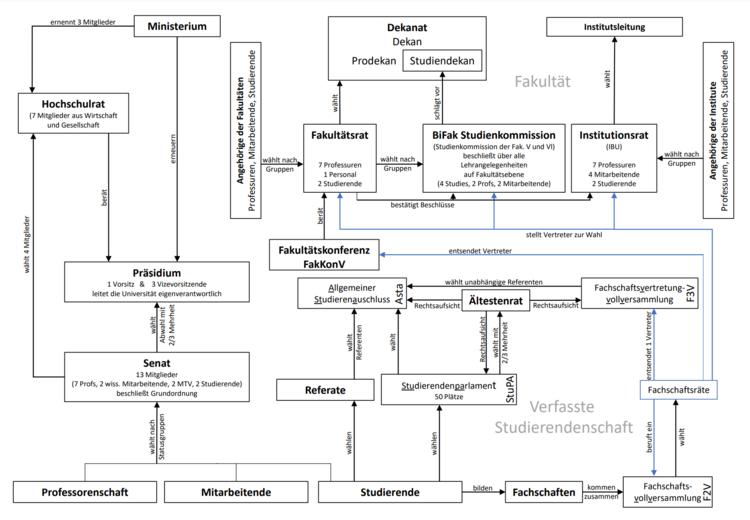Contact
The student council is always there to help and advise you with any questions you may have about your studies! You can reach us 24/7 (or longer if necessary) via email or social media.
Office hours (W2 2-227)
Student Body Meeting (W2 2-227)
Social Media
Committees & Councils
Committees & Councils
Even a university does not organise and administer itself. In order to cope with the sometimes very diverse tasks that always come up, there are a number of committees and councils that are not only made up of "high-ranking" members such as the president, but also university staff, professors and us students. But don't worry: in order to make the interests of bio students heard, we Schnäbler sit there for you! You can find a brief overview of the activities of the committees and councils in which we have a say here.
Institute Council
Biology is combined with the Environmental Sciences degree programme in one institute: the Institute of Biology and Environmental Sciences (IBU).
Our Institute Council therefore deals with all matters concerning both the study programme and research in Biology and Environmental Sciences at our university. Thus, among other things, personnel issues and resource allocations are discussed in the meetings, applications for third-party funding are (usually) approved, semester schedules are decided and problems from the study committees are discussed and decision applications are voted on. The meetings of the council consist of a public part (which anyone can attend) and a confidential part, which only the elected representatives can attend.
The council consists of elected representatives of all professors (7) from both disciplines, elected representatives from the staff group (2), elected representatives from the MTV group (2) and elected student representatives (2). The representatives of all groups, with the exception of the MTVs, have the right to vote.
Bifaculty study commission
The bifaculty study commission - BiFak for short - is a joint commission of the Faculties V (Mathematics and Natural Sciences) and VI (Medicine and Health Sciences) and usually holds monthly conferences with representatives of Biology (Faculty V) and Neuroscience (Faculty VI).
A special feature of the BiFak is that we students, with 4 votes (three for Bio and one for Neuro), have as many votes as staff and professors together (two each). The seats in the BiFak are elected for two years, the student representatives are elected for one year each. It is also possible to reappoint student representatives.
The BiFak is a classic "working body", but because of the very balanced distribution of votes, we as students can have a particularly big impact here! Prof. Gerhard Zotz is the current chair of the BiFak Study Commission (as of winter semester 2021/22).
Faculty Conference
Our former Wechloy-Treff serves to improve the exchange between the student representatives. In the faculty conference, representatives of all the student representatives of our faculty meet to discuss current issues and to exchange information about and coordinate joint activities.
The regular participation of the student members of the Faculty Council also allows them to report on decisions made by the Faculty Council and to discuss upcoming decisions with the others.
Students who are interested in appointments to the study commission or the appointment committees also come together via the faculty conference.
Faculty Council
The Faculty Council of Faculty V is the highest body at faculty level. It decides on the regulations of the faculty, in particular the changes to the examination regulations. Equally important is the election of the decanate, as the highest body of Faculty V.
The Faculty Council consists of elected representatives of the professors (7) of all disciplines of Faculty V, elected representatives of the staff (2), elected representatives of the MTVs (2) and elected representatives of the students (2).
F3V
Short for FachschaftsVertreterVollVersammlung.
The F3V sees itself as the second major pillar of student self-administration alongside the AStA and StuPa. It is legitimised by all the student councils at the university or their representatives. This means that it also represents those student councils that do not see themselves represented by the AStA, and also guarantees their political independence.
The meeting of the student representatives takes place once a week. At the F3V, information is exchanged, financial applications are made and university policy matters are discussed. This meeting of students from different degree programmes and departments makes it possible, among other things, to recognise interdisciplinary developments at an early stage that might remain hidden from the AStA (since it is not represented at this level). Necessary information work can be coordinated and further steps can be taken quickly.
But also more joyful things like joint flunkyball tournaments or werewolf game evenings often arise here in a short way.
Botanical Advisory Council
The Botanical Advisory Council advises the management of the botanical garden on the planning, development and design of the botanical garden. It also supports the Directorate in realizing decisions of the Faculty Council that affect the botanical garden. The advisory board is composed of two professors of the Institute of Biology and Environmental Sciences (IBU), one scientific staff member of the IBU, three staff members of the botanical garden and one student representative (us). While all of them are members of the advisory board for two years, the student representative is only on the board for one year.
Appointment committees
If a professorial position is to be filled, an appointment committee must be formed to carry out the procedure. For this purpose, representatives of the professors, staff, MTVs and students of the C.v.O. university are appointed from the respective study programme. In addition, two professors from another university will be asked to join.
The commission advertises the position, sifts through the applications and then selects a few from the applications received who are then invited. All those invited come to the university for an appointment and give two lectures: a teaching sample (for which the topic is given) and a lecture on their research. Afterwards, the committee conducts a personal interview with each of them. Three, at most four, candidates must be selected from those invited. Expert opinions on these candidates are obtained from external professors. Finally, a list of candidates is drawn up according to preference. Once this procedure has been completed, everything must be approved by the Institute Council, the Faculty Council and the Senate. Then the university can send the call to the person who is first on the list. If the person accepts the call, he or she is hired after some recruitment negotiations. If they reject the call, the call is sent to the second-placed person on the list.
Examination Boards
The examination board is composed of employees of a university or another higher education institution and student representatives. It decides on admission to the final examination, as well as on the recognition of certificates of achievement. If you are caught attempting to cheat in an examination, you are also invited in front of the examination board.
Admissions Committee - Master
With the ever-growing number of biological Bachelor's programmes, it is not always easy to keep track of the content. If questions arise as to whether or not a Bachelor's degree fulfils the requirements for a Master's degree, the admissions committee meets. Based on study records and course plans, a decision is then made on a case-by-case basis as to whether admission can be granted.
The admissions committee is made up of professors, lecturers and student representatives.




